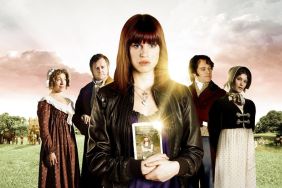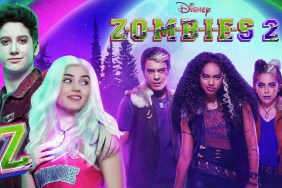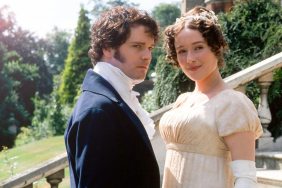
7.5 out of 10
Cast:
Lily James as Elizabeth Bennet
Sam Riley as Colonel Fitzwilliam Darcy
Bella Heathcote as Jane Bennet
Matt Smith as Mr. Collins
Douglas Booth as Mr. Bingley
Jack Huston as Mr. Wickham
Charles Dance as Mr. Bennet
Sally Phillips as Mrs. Bennet
Lena Headey as Lady Catherine de Bourgh
Millie Brady as Mary Bennet
Suki Waterhouse as Kitty Bennet
Ellie Bamber as Lydia Bennet
Aisling Loftus as Charlotte Lucas
Emma Greenwell as Caroline Bingley
Dolly Wells as Mrs. Featherstone
Jess Radomska as Annabelle Netherfield
Bessie Cursons as Lady Anne de Bourgh
Directed by Burr Steers
Pride and Prejudice and Zombies Review:
Elizabeth Bennet (James) and her sisters are prime examples of accomplished women of the Regency, knowledgeable in singing, dancing and chopping off the heads of the walking dead. They’ve had to become so in reaction to the ravaging horde unleashed by the sins of England’s past, creating a new culture where young ladies practice kung fu and clean their muskets in between balls and the arrival of eligible young men.
It is a predicament author Jane Austen could never have imagined when she dreamed up the Bennet clan several centuries ago and is every bit as silly as it sounds. This is not a bug of Pride and Prejudice and Zombies but a feature, one which does not obscure or ridicule its source but often enhances, shining a new light on what made it great to begin with. The mark of a classic is in the retelling; in the continued strength of its truths no matter how far from the original it is dragged.
It’s hard to imagine a book being dragged further than Seth Grahame-Smith’s quirky reworking of the Austen classic, but this turns out to be a good thing as the more extremely a work is bent out of shape, the more evident the value of its rewards is. Everything a fan of the original loved is still very much alive in this new adaptation, only more so as writer-director Burr Steers (Charlie St. Cloud) takes all of Austen’s subtext and makes it just text. Why have characters talk around their meaning in the niceties of the period when they can try and kung fu each other while talking in the niceties of the period and make their meaning perfectly plain.
The world building required to make such absurdities possible is the weakest part of Pride and Prejudice and Zombies – the requirement for some version of polite society to exist alongside the breakdown in natural order is taken for granted (characters remember the zombie apocalypse when it is funny or convenient, then go back to marrying off their daughters) – but even its failure brings a new perspective to elements already visible in the original. The Zombie Apocalypse, in this case, is the child of colonialism come back to bite England, literally, in the form of a plague which makes the infected ravenous for eating the brains of the living and generally spoiling whist parties.
To some degree it is the strength of the original writer which determines how well a work survives such stretching, but it’s also dependent on how well the adapter understands the material. While some writers and stories are indelibly tied to their time and place (Steinbeck needs The Great Depression like the axe needs the turkey) others have a great capacity for adaptation but only when the man in charge fully understands what is intrinsic to the original and must be kept.
Much of Austen’s sly observance is lost, replaced by a heightened silliness (that Steers faithfully replicates from Grahame-Smith’s own book) which plays the Regency romance and zombie action completely straight. These two very different tones don’t meld fluidly but in a fashion which enhances one another more than they detract.
The incongruities, like watching the Bennet sisters run around in the robes of Chinese monks practicing their wu shu, are both hilariously silly and earnestly heartfelt and the more Pride and Prejudice and Zombies does that the better. [Some enterprising Chinese filmmaker needs to make a wuxia version of “Pride and Prejudice”].
Some characters are better suited to this than others; it is a truth universally acknowledged that Matt Smith’s (Doctor Who) Mr. Collins is fantastic no matter what context he is in. Much as the others, his character has been ‘enhanced’ by more and more dialogue ticks in order to play up his obsequiousness, but in Smith’s hands it works showing a thorough understanding of the required tone. He could be in a movie about pirates in space being eaten by a carnivorous banana and he would steal ever scene he’s in.
And except for Smith it is Steers’ ear for that strange tone which carries the day; the actors do no harm but little help to their characters. James is very good at portraying Elizabeth’s feistiness, but much of the character’s wit and intelligence is buried under swords and gore; this Ms. Bennet is more proficient with sharp swords than sharp words. She’s a strong woman made stronger by the requirements of the world, but in some ways it’s an ersatz strength.
It recalls Jodie Foster’s words about Clarice Starling and her strength stemming from her mind and instincts as opposed to a man’s version of strength placed on a woman, beating up and shooting people. And, being based on a romantic narrative everything in the story ultimately comes down to the men when Elizabeth’s older sister (Heathcote) falls for the most eligible man in the county (Booth) while Elizabeth herself is caught in a vicious circle of attraction and loathing with Bingley’s best friend and England’s foremost Zombie killer, Colonel Darcy (a stiff and gravely Sam Riley).
And yet it is within the romance that Pride and Prejudice and Zombies’s finds it feet, melding the strength of Austen’s story with the weirdness of Steers’ world. The experience of watching two actors sincerely express Austen words exactly as intended when first written down while trying to kung fu each other to death is impossible to express in language. I would have thought the Germans would have a word for it, but even they are exceeded by the moment. You have let me down, Germany, you have let me down.
When the film is content to embrace that sort of absurdity it is fantastic; when its ambitions reach higher it falls apart. Much of that is tied to the zombies themselves who have been transmuted from the classical variation to be able to think and speak as they become a stand in for the lower classes being trampled on by those above them and itching to bite back.
It’s a good idea and one completely in keeping with Austen’s own themes about class (as long as you ignore the fact that it alters those themes to something like ‘the poor want rapprochement and a place at the table, but the rich recognize this as the beginnings of being gobbled up and destroyed and they must smash their replacements before that happens’) but in practice comes across as contrived rather than organic largely due to the poor initial world building.
The zombies themselves are in fact the weakest element of Pride and Prejudice and Zombies purely through execution, as the harder the film tries to tie Emily and Darcy’s personal issues into a larger story about the zombie horde, the less entertaining it gets. Damon Lindelof once spoke about story gravity and the perceived need to continue rapidly-increasing stakes a film races to conclusion to give the climax weight. The counter side of that is the weight can increase so rapidly you end up with a story black hole, sucking in and crushing all before it and leaving nothing behind.
Pride and Prejudice and Zombies suffers greatly from this the farther along it goes; the further away it gets from Austen’s narrative, the more it resembles a traditional blockbuster and it does not fare near as well in that department in part because it clearly does not have the budget for spectacle and in part because Steers’ best filmmaking instincts seem to abandon him during such moments. Not that a willingness to alter the narrative is wrong; some vestigial appendages such as the use of Catherine de Bourgh (Headey) or continued reference to the Four Horsemen of the Apocalypse rising and roaming around offer nothing to the story and stand out terribly when they do appear.
More often than not, however, Steers manages the tricky tone with skill and even sneaks in some new perspective on Austen in the process which is no mean feat. The artist who gets himself wrong (and there is art in adaptation as much as there is in originating) marks themselves as a fool; the one who gets it right marks the clairvoyant who saw and understood the original better than anyone else.
Pride and Prejudice and Zombies
-
Pride and Prejudice and Zombies

Bella Heathcote (left) and Lily James star in Screen Gems' PRIDE AND PREJUDICE AND ZOMBIES.
-
Pride and Prejudice and Zombies

Bella Heathcote in Screen Gems' PRIDE AND PREJUDICE AND ZOMBIES.
-
Pride and Prejudice and Zombies

Matt Smith in Screen Gems' PRIDE AND PREJUDICE AND ZOMBIES.
-
Pride and Prejudice and Zombies

(l to r) Sam Riley, Matt Smith and Lily James star in PRIDE AND PREJUDICE AND ZOMBIES.
-
Pride and Prejudice and Zombies

Jack Huston and Lily James in Screen Gems' PRIDE AND PREJUDICE AND ZOMBIES.
-
Pride and Prejudice and Zombies

Sam Riley and Douglas Booth in Screen Gems' PRIDE AND PREJUDICE AND ZOMBIES.
-
Pride and Prejudice and Zombies

Lily James (center) and Bella Heathcote (left) in Screen Gems' PRIDE AND PREJUDICE AND ZOMBIES.
-
Pride and Prejudice and Zombies

Lena Headey in Screen Gems' PRIDE AND PREJUDICE AND ZOMBIES.
-
Pride and Prejudice and Zombies

Douglas Booth in Screen Gems' PRIDE AND PREJUDICE AND ZOMBIES.
-
Pride and Prejudice and Zombies

-
Pride and Prejudice and Zombies

-
Pride and Prejudice and Zombies

-
Pride and Prejudice and Zombies

-
Pride and Prejudice and Zombies

-
Pride and Prejudice and Zombies

Director Burr Steers and Lily James on the set of Screen Gems' PRIDE AND PREJUDICE AND ZOMBIES.
-
Pride and Prejudice and Zombies

Director Burr Steers on the set of Screen Gems' PRIDE AND PREJUDICE AND ZOMBIES.
-
Pride and Prejudice and Zombies

-
Pride and Prejudice and Zombies

-
Pride and Prejudice and Zombies

-
Pride and Prejudice and Zombies










